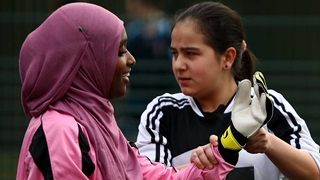
Alongside Kick It Out, we have today launched a new joint action plan to proactively tackle incidents of discrimination and serious misconduct in grassroots football.
The action plan follows new research we commissioned with Kick It Out, which was undertaken to help identify ways to improve reporting, awareness, and handling of incidents of discrimination and serious misconduct in the grassroots game.
The research confirmed that incidents of discrimination in grassroots football could be more than double the reported figures of 1,894 incidents for the 2021-22 season. It also found that while almost all incidents experienced by ethnic minority groups met sanctioning thresholds, these incidents were significantly more likely to go unreported.
Of the 3,417 participants surveyed, 42% of respondents had encountered a discriminatory incident during their time in grassroots football with 26% experiencing or witnessing discrimination in the past 12 months.
More than a third witnessed abuse based on race (37%), followed by colour (31%) and ethnic origin (26%). In addition, 19% had seen discrimination based on gender, 16% based on sexual orientation and 6% witnessed those with disabilities targeted.
The research also identified a widespread perception among grassroots participants that action would not be taken if discriminatory abuse was reported, with only 34% of respondents believing that incidents lead to a charge. However, while every report is investigated, 62% of reported incidents led to a charge during this period.*
Several barriers to reporting were identified, including fear of the consequences after reporting an incident, a desire by victims to put incidents behind them, low confidence that action will be taken, uncertainty around the seriousness of an incident, and a lack of awareness of the reporting process.
More than half of women (56%) who have experienced discriminatory abuse stated that they experienced it based on their sex or gender.
Abuse is not only classed as verbal, but also less overt forms of discrimination. For example, the survey also included participant feedback saying that there was a greater perception among women and ethnic minorities that they were more likely to not be picked for teams or face decisions going against them based on protected characteristics. Not being welcomed at a club was the second most common form of discriminatory abuse experienced by Asian participants.
Using the insight gathered, alongside Kick It Out we have developed a joint action plan focusing on three areas: increasing awareness and knowledge of serious incidents; improving reporting; and tackling specific problem areas where serious incidents are most prevalent.
As part of this work, Kick It Out has expanded its grassroots team, developed specific educational resources, created better pitch access opportunities for underrepresented groups, and is working to increase the number of clubs and leagues they interact with through Kick It Out’s Equality Charter.
The action plan also builds on our ongoing work to address unacceptable and discriminatory behaviour across the grassroots game, which includes the introduction of point deductions for teams that commit repeated offences. We have also launched a new EDI ambassador scheme across our County FA network, approved reduced regulatory time limits, and is set to expand its body camera trial for more grassroots referees. Meanwhile, we recently launched Enough is Enough, a campaign which aims to raise awareness of discriminatory behaviour and its consequences in grassroots football.
The research comes ahead of us publishing our Annual Discipline Review for the first time, to provide greater transparency on reporting statistics and the number of cases that have resulted in proven outcomes. It is hoped this will improve confidence in the reporting process across the grassroots game.
Tajean Hutton, Kick It Out’s Head of Grassroots Football, said: "It’s clear that discrimination remains a serious issue in grassroots football and that several barriers still exist which prevent participants, particularly ethnic minorities and women, from reporting incidents.
"It’s vital that we find solutions to removing those obstacles and this research gives us invaluable insight into what is happening at a grassroots level, as well as equipping our grassroots team with the knowledge to tackle the issues identified head-on.
"We commend The FA’s commitment to addressing serious incidents in grassroots football and will continue to work closely with our partners across the game to ensure that tackling discrimination is at the top of football’s agenda."
FA Head of Grassroots Operations, Tim Foster, said: "Together with our partners at Kick It Out, we are committed to creating a game that is safe, welcoming and free from any form of discrimination. Building a good understanding of the challenges we face is very important – and this new research provides us with valuable insight that will help us to focus on the key areas where we can make a positive difference.
"Each season, over 100,000 teams participate in over one million fixtures across the country, and whilst reported incidents of discrimination are not commonplace, we know from this research that the number is growing and can often go unreported. To help tackle this, The FA and Kick It Out have developed a joint action plan to ensure that perpetrators face consequences for their actions, with stronger sanctions already in place, whilst also making the reporting of incidents easier and helping to build trust in the process."
Reporting should be everyone’s responsibility – not just those who experience it. If you witness discrimination at a game, report it to the match officials, Kick It Out, The FA, or your local County FA so the matter can be fully investigated.
Together we will Kick it Out.
* This belief is higher among referees (45%) but lower among ethnic minorities groups (30%), particularly people from Asian backgrounds (26%).









